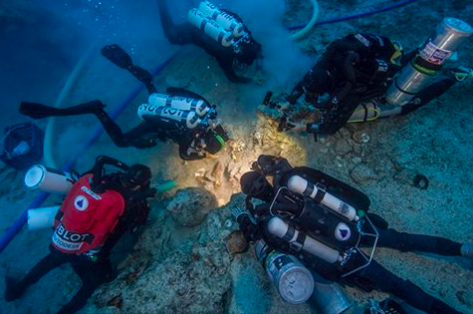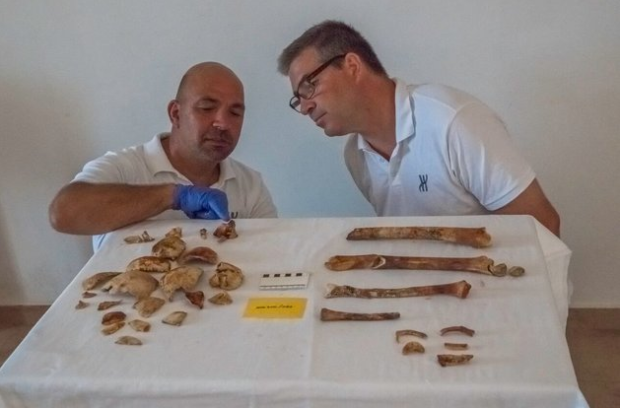2,000-year-old human skeleton recovered from shipwreck

Archaeologists excavate the Antikythera shipwreck’s skeletal remains. Screen Grab from Facebook/PenDragon Heritage
In one of the most important discoveries in recent memory, archaeologists have unraveled a human skeleton dating back more than two millennia from the famed Antikythera shipwreck in 1900.
The remains were excavated last month on the ocean floor off the Greek island of Antikythera in the Aegean Sea.
“Against all odds, the bones survived over 2,000 years at the bottom of the sea, and they appear to be in fairly good condition,” Dr. Hannes Schroeder of the Natural History Museum in Copenhagen, Denmark, an expert on DNA, said in a Huffington Post report.

Antikythera Project codirectors Theotokis Theodoulou and Brendan Foley inspect the skeletal remains: skull and upper jaw with teeth, two femurs, radius and ulna arm bones and ribs. Screen Grab from Facebook/PenDragon Heritage
Among those recovered were three teeth, arm and leg bones, as well as several pieces of rib. The parts were the first to be tested during the era of DNA sequencing.
Schroeder, meanwhile, described the discovery as “incredible,” while Dr. Brendan Foley of the Woods Hole Oceanographic Institution, who is a member of the research team, shared the assessment.
“This is the most exciting scientific discovery we’ve made here,” Foley was quoted as saying in the report, adding that he believed the passenger or crew member “was trapped in the ship when it went down and he must have been buried very rapidly or the bones would have gone by now.”
The crew of divers said some of the bones remained on the seafloor, but others have been brought to the surface for further analysis.
The research team led by Dr. Foley confirmed that they might be able to gather DNA from the skeleton and identify the individual’s gender and hair and eye color, as well as his or her ethnicity and geographic origin.
The Antikythera wreck, which is believed to be of a Greek trading or cargo ship, is the largest ancient shipwreck ever discovered.
Some divers near the wreckage have reportedly recovered a wealth of extraordinary relics—including glassware, gold jewelry, marble statues and an ancient weapon known as a “dolphin.”
An extremely rare clock-like artifact called “Antikythera Mechanism” was also obtained from the ship’s remains and is now held at the National Archaeological Museum in Athens, Greece.
The ancient device is believed to have been used to predict celestial events and is considered the world’s first computer. Khristian Ibarrola














